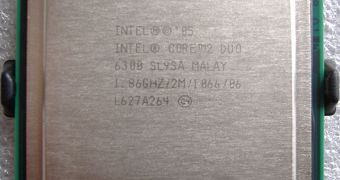Intel is known as the greatest central processing unit maker in the world and its chips are so widespread and common that it is widely believed that the company's x86 chips could provide a very strong competition to the ARM architecture. This idea is prominent even despite the fact that there really are no Intel-powered mobile phones to speak of. In opposition to this idea, the ARM CEO claims that, even if the Santa Clara-based company were to enter the mobile battle, it would not possess any sort of strong advantage.
The idea that Intel could sweep the mobile market off its feet stems from the significant marketing campaigns that always accompany the x86 architecture. Intel's chips are popular because they support Microsoft Windows, whereas a lot of consumers still don't know that the cellphone in their pocket uses an ARM processor. ARM's lack of support for Windows is the main element that has so far prevented it from spreading to the computing segment.
ARM Chief Executive Officer Warren East claims that Intel isn't the only company developing high-performance chips and that their processors have no special feature that would make them better than ARM chips in mobile solutions. On the other hand, the power consumption of ARM chips is significantly lower than that of x86 processors, which has so far kept the former as the preferred solution in portable consumer electronics.
“ARM roadmap does not stand still,” East said. “We move on from ARM11 to Cortex-A8 to Cortex-A9 products. We’re licensing the generation after Cortex-A9 at the moment with huge levels of performance. Moving on, we have roadmaps with 64-bit and virtualization. Then you come to the semiconductor technology and people say ‘Well, Intel's got some superior semiconductor technology.’ Maybe they are six months ahead of the likes of TSMC, Globalfoundries and IBM. We taped out our first 22nm structures the other day. We’ll have 32nm microprocessors in volume in the middle of this year from some ARM partners. So there isn’t a process advantage either.”
The ARM CEO concedes to the fact that the PC market is rightfully aimed at x86 chips, but says that the mobile segment is still ARM's territory. He also believes that versions of the Linux operating system will provide an experience similar to Windows, seeing how, according to him, consumers aren't concerned with the OS as long as the device performs well and has a working, comprehensive interface.
Warren East added that, “In this world of the mobile Internet going forward, now, that's ARM. To make a good consumer experience, you need good browser experience, good plug-ins, good operating systems. […] A consumer doesn't want to know about the operating system... […]. There’s a whole load of browsers, plug-ins and enablers [for ARM]. […] If you look at what's been accomplished in 18 months to two years and compare that to the 25 years of the Wintel monopoly, it's clear that the consumer experience on Linux-based desktops ... in a relatively short period of time is catching up quickly.”

 14 DAY TRIAL //
14 DAY TRIAL //